Why I Waited 22 Years Before Getting Married
Part 1: TEENAAA:The Terrifying Specter of Richard Benjamin
Dear friends, family and others,
I believe that covers everyone.
This is to inform you that after 22 years of living together in un-wedded bliss, my beloved and I have finally tied the knot.
We also got married.
That is the kind of humorous play on words that you have come to expect from me so I threw it in to get things off to a good start. (LOL, as we say on the internet. Or Ha!Ha! if we are opposed on principle to LOL, as I am.) I wanted to begin with some levity because I am aware that having read my opening paragraph, some of you have begun to feel a rising rage as it occurs to you that after all the things you invited me to over the years, I did not reciprocate by inviting you to share this, the presumably happiest day of my life. To you I say: relax. You are in the company of Nobel prize winners, Academy Award nominees and leaders of great nations. None of them were invited either. In fact, no one was invited. There were no festivities, no ceremony, no guests, no wedding outfits, no reception afterward.
“Really? WHY NOT?” You are probably replying “You’re getting pretty old. This is likely your one and only wedding. Why no celebration?” Now I will pause and wait for you to finish turning to whoever is in the room with you to remark, ‘What is wrong with her?”
That is why I’m writing. I feel I owe you an explanation. Although I work diligently at paying no attention to the progression of numbers that define the aging process, I have seen forensic evidence that indicates I was one of only 5% in my age group who never got married or had children. Had I been a more tradition-oriented person, by the time I finally went through with the nuptials last year, I would have been entering into the bonds of holy matrimony for the fourth, not the first time. Yet I continue to feel greatly relieved that I did not take this path. But I also have started to wonder why I, a seemingly clear headed person, intentionally avoided this revered rite of passage for most of my life. So I am offering this letter of explanation in lieu of a lovely celebratory party where I would have served top of the line champagne, had great live music, and offered a wide variety of chocolatey desserts with buttery crusts. Real chocolate, too. None of that waxy stuff or waste-of-time fake-healthy processed fruit crap either.
“That sounds phenomenal!” I can hear you responding, “Just throw the damn party. No one needs a lengthy explanation of your behavior.” To which I must reply “ I’m a writer. Parties scare me. Writing doesn’t.” So: here we go.
REASON # 1: FEAR OF RECOIL
How to explain why I spent most of the days leading up to my wedding to a man I love, with whom I had been happily sharing my life for two decades, overwhelmed by a dizzying case of nerves about ‘pulling the trigger’. And how to explain why, when referring to finally experiencing the heightened romantic moment that others long for, I found myself using the phrase ‘pulling the trigger.’
This brings us to the meat of the problem. (And since I am a vegan, when I choose the word ‘meat’ as a descriptor, it means the gloves are off.). Here it is: For the entirety of my life, the idea of marriage terrified me. I had accumulated so much pure fear around the word ‘marriage’ that in the eighties, when I worked as a reporter in local news in Los Angeles , I once took a camera crew to city hall to document the terror I was sure I would find in the faces of soon to be newly-weds as they filed their life-changing paperwork. No one was more surprised than I was to see what looked like joy. I honestly didn’t believe that was possible under these circumstances.
Reason 2: THE WISDOM OF PILLOWS AND BARBECUE APRONS.
The very idea of picking a mate for life seemed to be a task so gargantuan and fraught with possibilities for mistakes that every time I’d read a statistic like “the average duration of a marriage in the United States of America is 8.2 years,’ it was hard for me not to conclude that adding a statistically failure-prone covenant like marriage to a healthy 22-year relationship would be taking a dangerous step in the wrong direction. Or, as they say on souvenir ashtrays, potholders, pillows, tee shirts and barbecue aprons, “If it ain’t broke, don’t fix it.”
REASON # 3: Diary of a Mad Housewife
I am about to go into detail about my favorite parts of this movie because I recently learned that MOST of the people I know have NOT seen it. You can watch it on You Tube, here. I think it is also on Disney+. It was first released in 1970.
And it is given the exalted position of Reason # 3 in my list because it managed to collate all my terror of getting married into an hour and a half of vivid images and dialog so perfectly written it froze my soul. After I saw it, for the next five decades, the details of the insufferable lawyer/husband character in the story, Jonathan Balser, actively haunted me every time I met a husband of any kind in the real world. As played by Richard Benjamin, Jonathan Balser remains one of the most terrifying men I have ever seen portrayed. And yes, I have seen “Nightmare on Elm Street.” I have seen ‘The Babadook.’ and ’Halloween.’ But it is Jonathan Balser who recurs in my nightmares. I should add at this point: He is also hilariously funny.
I attended the movie for the first time with my then boyfriend, a guy who my now-husband calls “Brawny Paper Towels,” because of his resemblance to the plaid-shirt-wearing, bearded guy that appears on their package. In many respects, Brawny P.T. was a nice enough guy. But he also reminded me a little of Jonathan Balser.
The titular diary keeper and star of the movie is Carrie Snodgress playing Tina Balser, Jonathan’s sweet, pretty, cooperative and seemingly guileless wife. Yet Jonathan’s voice is the very first thing we hear when the movie fades in from black. He is standing in front of the sink in the master bathroom, just a few feet from the bed where his wife is sleeping. The camera pans over to the sleeping Tina as Jonathan chides her to “snap to it.’ He then proceeds to wake her up to a complete listing of all her faults: she sleeps too much, she smokes too much. “You’re too thin. You used to have a terrific figure” he says, as she pushes herself upright, her face void of all expression, while she lights a cigarette. He continues: “But now you’re so bloody skinny. And that awful hair of yours. Just hanging down. No style. Maybe you don’t care what you look like in front of me and the girls but what about the rest of the world? You’re Mrs. Jonathan Balser, MY WIFE. You’re a reflection of me!”
We now move on to a collection of scenes that show us the sort of household chores that make up Tina’s daily routine, starting with breakfast, where Jonathan sits at the head of a formally set breakfast table, all dressed up in his gray three-piece-suit and tie. Right beside him are the couple’s two daughters who are being schooled by Dad about what an inadequate job their mother is doing. “Tina, is THIS a four-minute egg?” he asks with a derisive laugh, rolling his eyes toward their daughters and shaking his head in disbelief. “Your mother made Phi Beta Kappa at Smith but I don’t think she can make a four-minute egg! “ he chuckles sarcastically.
“Some more toast, Teen” he says, casually handing her his empty toast plate. “Gee, that’s a little light” he says, gazing down at the additional toast she immediately brings him. “I’m sorry. I hurried it, sweetie” she apologizes, trying to find a moment to fit in a sip of her own coffee. But not so fast. He hands the plate back to her. “Could I have a little more Damson plum preserves?” he says. So she puts her coffee down and sprints back into the kitchen.
From the very first moments of this film, which I saw when I was a junior in college, I re-committed to my plan to never get married. In a related story, for most of the years that I knew my mother, she was in a bad mood, perhaps irritated by the endless, tedious and frequently pointless chores she had to do every day. Watching ‘Diary of a Mad Housewife’ that summer evening at the mall was the catalyst that pulled everything together for me.
My family was not like the Balsers exactly. My father was not smug and supercilious. He was a very nice, very traditional cis man who even made his own breakfast. He worked hard at a job so he could support a family. But he also demanded that his wife give up her job when he married her. The wisdom in the culture right then said that her financial independence was a black mark against his ability to be a provider. Recently I brought this idea up in a discussion with friends at dinner. “My Dad was like that too,” said my friend Jack, “I remember when my mother got a job. And my father said to her ‘Why are you trying to embarrass me?” This was in the 1960’s.
For a purely infuriating sequence between a husband and a wife, it would be hard to do better than the scene where Jonathan gets the flu. There he sits in bed, in his pajamas, pouting and barking a litany of commands. ” Tina!” he yells like a petulant prince calling for his waitstaff, ”Teeee-naaaaa.”
And when she appears at the bedroom door, out of breath from running to his side, he offers a patronizing smile. “I’ve got this terrible craving for a tall lemonade.” he announces, “Make me the old- fashioned kind, Teen. With plenty of cracked ice, not cubes. And sliced lemons.’ She sighs, then heads off to do his bidding, but he immediately calls her back to add, “And Teen, put in a touch of grenadine, will you?”
Hang on! It gets worse. “Diary of a Mad Housewife” also contains perhaps the most atrocious sexual come-on ever committed to film. In Richard Benjamin’s bravura performance, he sidles up to her with a smarmy erotic grin and, in a baby talk voice, coos “How about a little old roll in de hay?” To witness this is to have your life changed forever.
Eventually, because Jonathan is very busy attempting to ingratiate himself with people of status, Tina meets a famous novelist/predator named George Prager at a hipster art party. A caustic, misogynistic womanizer, played by Frank Langella, he pulls Tina into his orbit by negging her. We have spent the first half of the film watching what she regularly endures with Jonathan. Now we are faced with having to watch her jump out of the frying pan and into the fire.
The main thing that George has to offer Tina, besides his literary cred, is that he is sexier than Jonathan. Of course, how could he not be? So when he phones and dares her to come over, he sets up the power structure for a masterful round of every narcissist’s favorite gambit: “Come here. Go away!” Unfortunately she agrees to show up at his apartment, thinking she can escape a marriage where she has absolutely no power by stumbling into an affair where she has even less.
“You know anything about me aside from my work? It’s all true.” he says almost immediately, generously offering her a transparent blueprint of what bad results she can expect from this dalliance. This is where the spider-and-fly moments in the movie become almost unbearable. There is deep pain to be had watching Tina meet his challenge with false bravado. “I take it this is the big warning.” she says, trying to position herself as a worthy opponent using a transparent I’m-a-tough-girl-you-can’t-hurt-me facade, “Well, you can skip it.” she says, “ I can take care of myself.”
From here on, the brilliant screenwriter Eleanor Perry delivers an impeccable x-ray of the nasty, but perfectly calculated chess moves made by George as he not only successfully establishes his control of the situation but transforms himself in to the victim by convincing Tina that the two of them are equal in their feelings of vulnerability. By claiming to be scared, he persuades Tina that she has such innate powers of magnetism over him that she has made a famous tough guy drop his gruff exterior. The only thing Eleanor Perry forgot to add to this scene is an air raid siren and a flashing screen warning that says “GET OUT. NOW!”
Instead, she makes us watch full screen close-ups of Tina, hypnotized by sex, intercut with George’s slowly moving hands, unzipping, unbuttoning her clothes. It ends with the two of them, naked under a blanket on the floor as he tells her she is ‘an incredible piece of ass’. (Which brings us to another moment in this film that always stops me cold because I am overcome with memories of how even progressive women in the 1970’s agreed, for some reason, to interpret lines like “You’re a piece of ass” as a complement!)
“Who taught you all of that?” asks George, demonstrating his version of after-glow banter. “Did you screw around a lot since you got married?” “No. Never before “she confesses, “I believed in all those square virtues. Fidelity. Loyalty. Nothing you’d understand.” “Well, what the hell do we do now? “ says George, as we watch him tighten the spider web she doesn’t even know is around her so she won’t be able to escape before he is finished with her. “I thought you’d be good for a couple of screws but this could get out of hand.”
To give credit where credit is due, George repeatedly TRIES to show Tina the entire blue-print for what is going to happen. He is all of the witches from Macbeth rolled into one. Every line he speaks is prophecy. But because she refuses to listen, now we must witness Tina allowing herself to be batted around like a tetherball, only partially understanding what is happening. In a way, it’s a 1970’s version of the 1959 Joseph Von Sternberg film, ‘The Blue Angel’ with Richard Benjamin and Frank Langella sharing the role of Marlene Dietrich. (which is another film you should watch.)
“Don’t worry. I have no intention of getting involved with you.” Says Tina, imagining she is demonstrating how she can hold her own with the big boys. No, says George. “I’m the one who is not going to get involved with you.” Regrettably, George sees her more clearly than she sees herself. “For females like you, sex, particularly great sex… there’s got to be love….” George tells her, making sure she knows how detached he is by paging thru a magazine while he talks, “The thing this hangs on is can you have a straight sex thing or not? It’s not going to be easy for you. I know your type.”
“What type is that?” she asks, and he obliges her by dismissively listing some of her details like “You edited the yearbook.” Sadly, she is titillated by how a famous writer has bothered to observe her closely enough to reduce her to a sociological stereotype. Naturally they will be having more sex soon and he will continue to insult her.
”Well, it’s certainly not a love affair” she retorts, a little later on in the film when she has finally been pushed hard enough that she is getting ready to walk out.“There are, I believe, other terms” he snipes back. “Save ‘em for your bloody awful books.” she sputters, inadvertently hitting him in the only place where he can actually feel pain: his professional ego. He is ignited into a natcissistic rage so intense he ends up pinning her against the wall. ‘You take that back.’ he snarls.
Cut to me, watching the film for the fifth time and yelling like I am at the final playoff game of the world series; “NO..Do NOT take it back.” But does Tina listen to me? She does not. She ends up destroying what should have been her winning point by voluntarily stepping into more of the acutely observed perverse-love details that Eleanor Perry has written into ‘Diary of a Mad Housewife.” I am not aware of another movie depiction of miscreant love that offers this much clarity.
The scene ends with the two of them making an appointment to see each other in a week. “You’ll be crazy about me’ George says, again offering her accurate prophecy. “You’ll throw tantrums and become possessive and make demands. So, if you decide you don’t want to play it my way, just don’t come.”
“It’s a deal” she says, blind-sided by the big sexy kiss he gives her, knowing that it confuses her and keeps her ensnared. Then he picks her up and deposits her outside his front door : a perfect moment of bad-love cryptic foreshadowing.
Now it’s the holidays and we see Tina exhausted on Thanksgiving, after creating a 1970’s Martha Stewart-level table setting that pleases neither of her two brainwashed daughters, or their awful father. Unfortunately, Tina hasn’t made enough personal progress not to ricochet back to George’s apartment. And so we must continue to witness how she cooperates with her own degradation. Eventually there is some very sad Christmas gift exchanging after which Tina brings things to a head by watching him make a phone appointment with another woman.
‘Oh please. What are you trying to prove?” Says George, irritated by her angry reaction “That I’m a rat? A bastard? You knew that. That’s why you come here.”
Unbelievably, there is still another scene at George’s apartment where they are getting out of the shower together. Because, lets face it, in real life there is always another unnecessary scene after every bad hand has been played. This time George looks at her and cracks “You’re getting too damn skinny. I can see your ribs.” And BOOM, we’re right back where we started in the first scene, only now the complaint is coming from George.
“You rotten sadistic son of a bitch,” she eventually growls at him. “Yes. And that’s what turns you on,” he replies,“That’s what makes our sex so fantastic. You’re goddam right I’m a sadist. And you’re the perfect willing victim.”
Aaaggghhh.
A final scene with Jonathan has him confessing that he lost all their money in a bad investment, has been having an affair behind her back and also holds himself responsible for “neglecting you…in the hay.” We all shudder, praying Tina isn’t considering a reconciliation as we dissolve to the end of the film: a seventies version of Group Therapy. The other members of the group are being allowed to take turns unloading their rage onto Tina, who has managed to find another masochistic way to waste her own time. As the credits roll, exasperated women in the group want to know why she is complaining since she has a husband, a boyfriend and an eight-room apartment on Park Avenue! Enraged men yell insults at her lack of empathy.“Your husband works hard to support you, in return for which he wants the house clean, the buttons sewn on and a modest amount of sexual intercourse.”says one white middle-class guy. (For younger readers: When this movie was released, we still had a middle-class.)
I was numb when I left the theater, a shell-shocked girl who now realized she was in a relationship with a boyfriend who apparently just watched a completely different movie. “I thought it was too exaggerated,” he said.
That night I wrote in my diary for the second time since I was ten ”I’m never ever getting married. Never.”
There’s an interesting coda to all this. Apparently Neil Young, after watching this movie, wrote the song “A Man Needs a Maid.” Then he found a way to meet Carrie Snodgress and they were married for a few years.
Up next: Part 2. ‘The Parable of The Elevator’ and ‘What Betty Saw.”





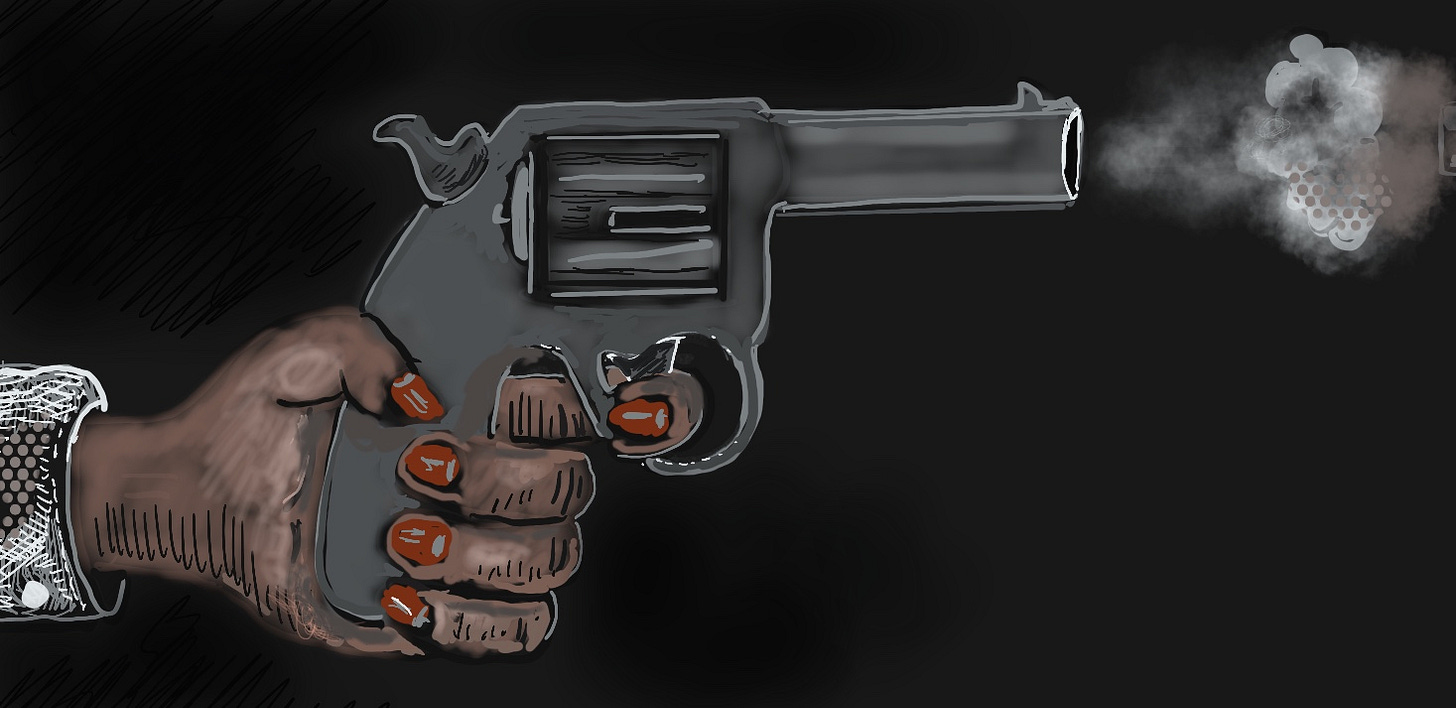
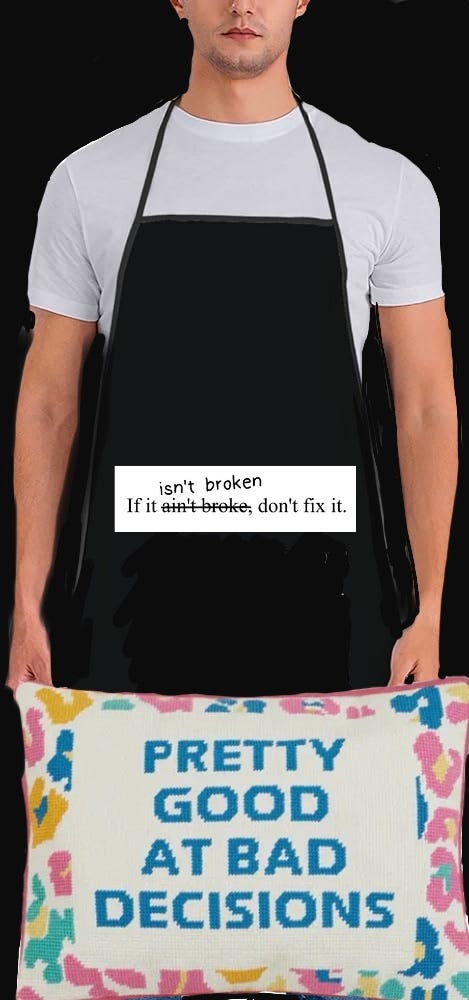
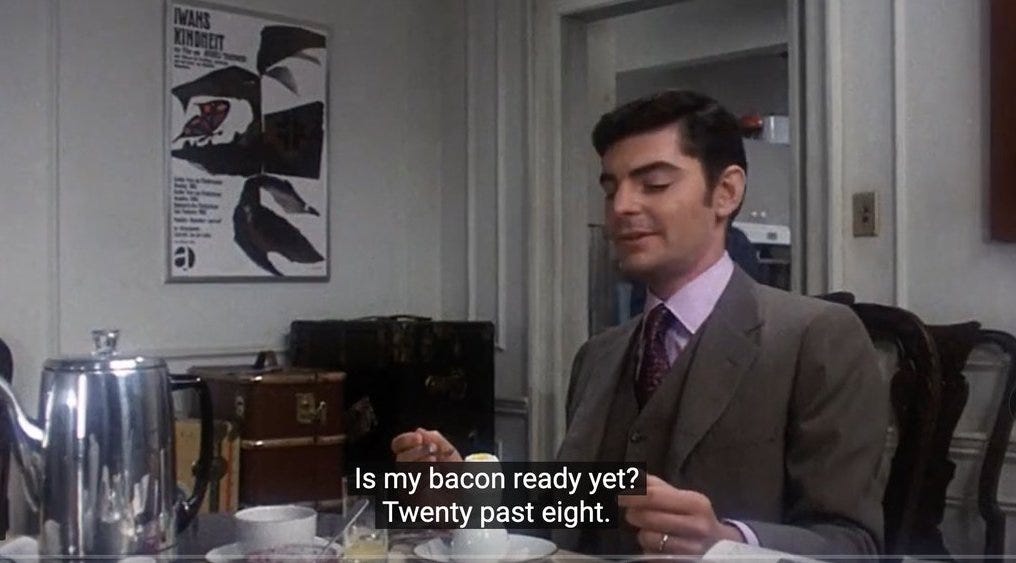


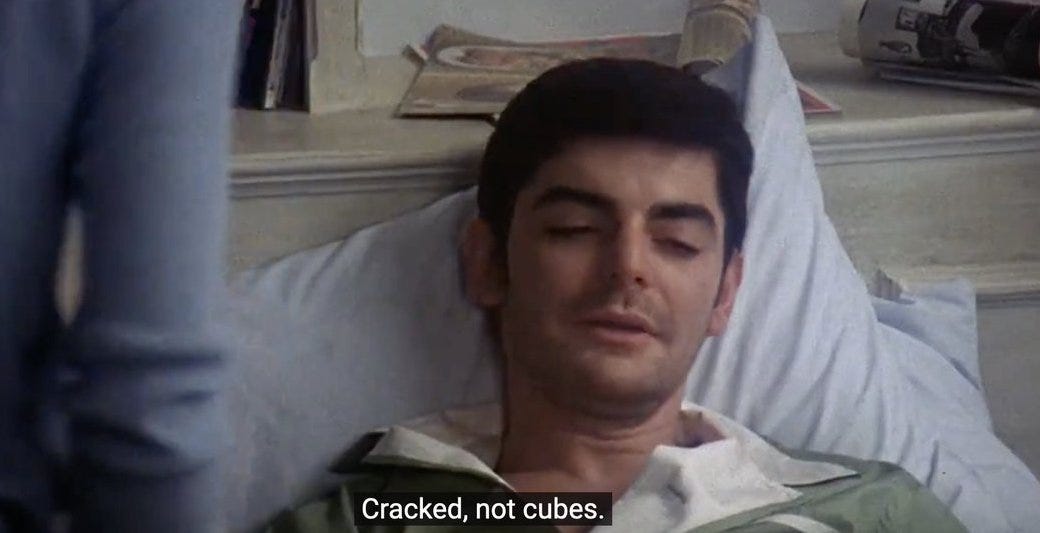
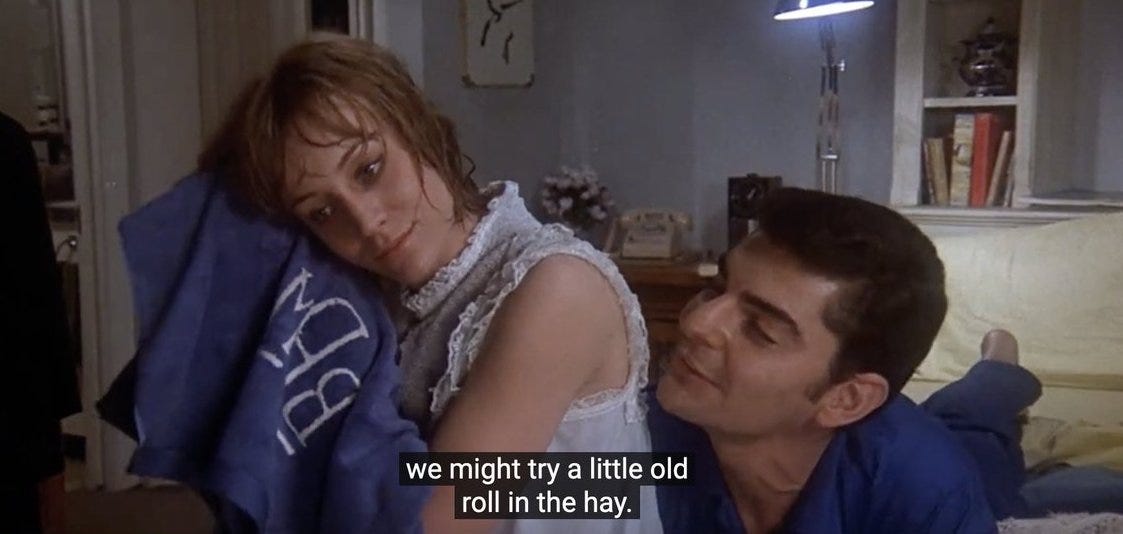

Wow. That movie is a prime course in how NOT to treat a woman.
If my (ex) father-in-law ever observed my (ex) husband doing something unmanly, (let's say, doing dishes, changing a diaper etc.) he would sometimes lean in and say: "Son, why have a dog and bark yourself?" Not making this up ... Another brilliantly dark post from you though, thank you.